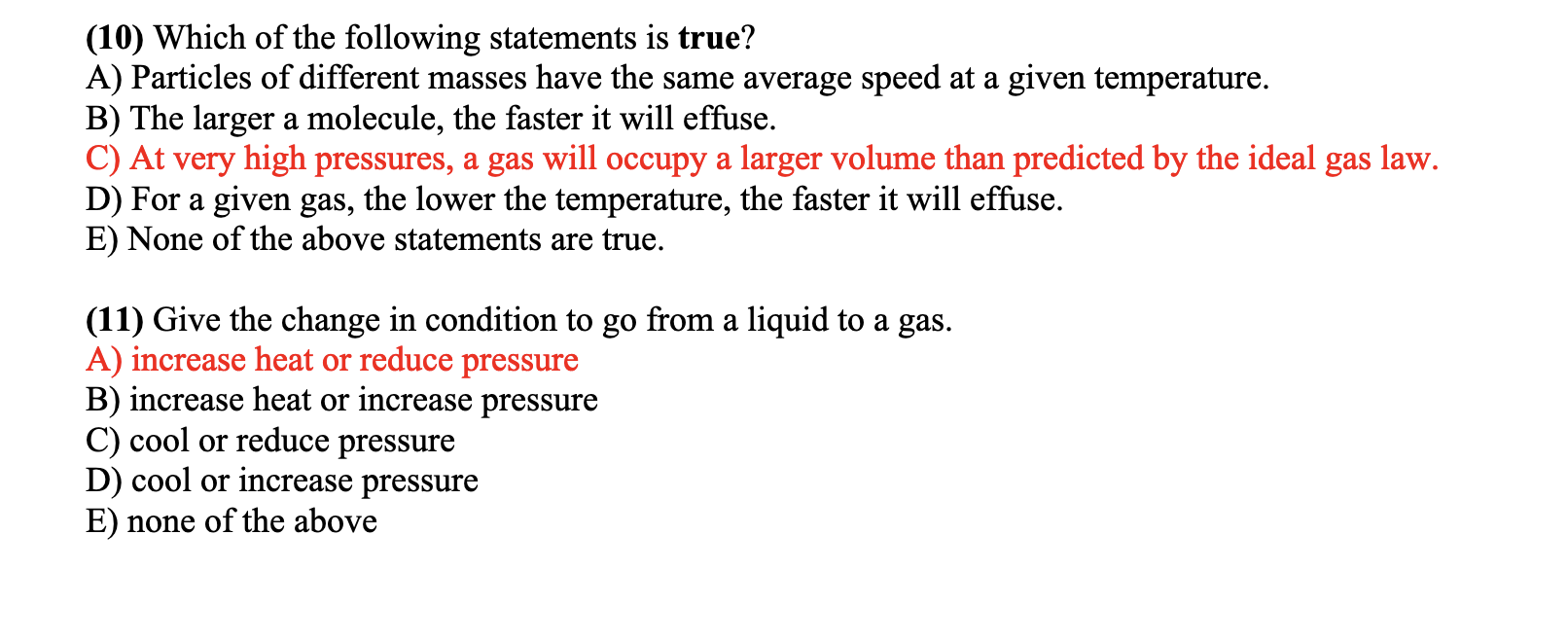(10) Which of the following statements is true? A) Particles of different masses have the same average speed at a given temperature. B) The larger a molecule, the faster it will effuse. C) At very high pressures, a gas will occupy a larger volume than predicted by the ideal gas law. D) For a given gas, the lower the temperature, the faster it will effuse. E) None of the above statements are true. (11) Give the change in condition to go from a liquid to a gas. A) increase heat or reduce pressure B) increase heat or increase pressure C) cool or reduce pressure D) cool or increase pressure E) none of the above
(10) Which of the following statements is true? A) Particles of different masses have the same average speed at a given temperature. B) The larger a molecule, the faster it will effuse. C) At very high pressures, a gas will occupy a larger volume than predicted by the ideal gas law. D) For a given gas, the lower the temperature, the faster it will effuse. E) None of the above statements are true. (11) Give the change in condition to go from a liquid to a gas. A) increase heat or reduce pressure B) increase heat or increase pressure C) cool or reduce pressure D) cool or increase pressure E) none of the above
Chemistry: Principles and Reactions
8th Edition
ISBN:9781305079373
Author:William L. Masterton, Cecile N. Hurley
Publisher:William L. Masterton, Cecile N. Hurley
Chapter5: Gases
Section: Chapter Questions
Problem 78QAP
Related questions
Question
why 11

Transcribed Image Text:(10) Which of the following statements is true?
A) Particles of different masses have the same average speed at a given temperature.
B) The larger a molecule, the faster it will effuse.
C) At very high pressures, a gas will occupy a larger volume than predicted by the ideal gas law.
D) For a given gas, the lower the temperature, the faster it will effuse.
E) None of the above statements are true.
(11) Give the change in condition to go from a liquid to a gas.
A) increase heat or reduce pressure
B) increase heat or increase pressure
C) cool or reduce pressure
D) cool or increase pressure
E) none of the above
Expert Solution
This question has been solved!
Explore an expertly crafted, step-by-step solution for a thorough understanding of key concepts.
This is a popular solution!
Trending now
This is a popular solution!
Step by step
Solved in 2 steps

Knowledge Booster
Learn more about
Need a deep-dive on the concept behind this application? Look no further. Learn more about this topic, chemistry and related others by exploring similar questions and additional content below.Recommended textbooks for you

Chemistry: Principles and Reactions
Chemistry
ISBN:
9781305079373
Author:
William L. Masterton, Cecile N. Hurley
Publisher:
Cengage Learning

Chemistry for Engineering Students
Chemistry
ISBN:
9781337398909
Author:
Lawrence S. Brown, Tom Holme
Publisher:
Cengage Learning

Introduction to General, Organic and Biochemistry
Chemistry
ISBN:
9781285869759
Author:
Frederick A. Bettelheim, William H. Brown, Mary K. Campbell, Shawn O. Farrell, Omar Torres
Publisher:
Cengage Learning

Chemistry: Principles and Reactions
Chemistry
ISBN:
9781305079373
Author:
William L. Masterton, Cecile N. Hurley
Publisher:
Cengage Learning

Chemistry for Engineering Students
Chemistry
ISBN:
9781337398909
Author:
Lawrence S. Brown, Tom Holme
Publisher:
Cengage Learning

Introduction to General, Organic and Biochemistry
Chemistry
ISBN:
9781285869759
Author:
Frederick A. Bettelheim, William H. Brown, Mary K. Campbell, Shawn O. Farrell, Omar Torres
Publisher:
Cengage Learning

Chemistry: Principles and Practice
Chemistry
ISBN:
9780534420123
Author:
Daniel L. Reger, Scott R. Goode, David W. Ball, Edward Mercer
Publisher:
Cengage Learning

General Chemistry - Standalone book (MindTap Cour…
Chemistry
ISBN:
9781305580343
Author:
Steven D. Gammon, Ebbing, Darrell Ebbing, Steven D., Darrell; Gammon, Darrell Ebbing; Steven D. Gammon, Darrell D.; Gammon, Ebbing; Steven D. Gammon; Darrell
Publisher:
Cengage Learning

Principles of Modern Chemistry
Chemistry
ISBN:
9781305079113
Author:
David W. Oxtoby, H. Pat Gillis, Laurie J. Butler
Publisher:
Cengage Learning